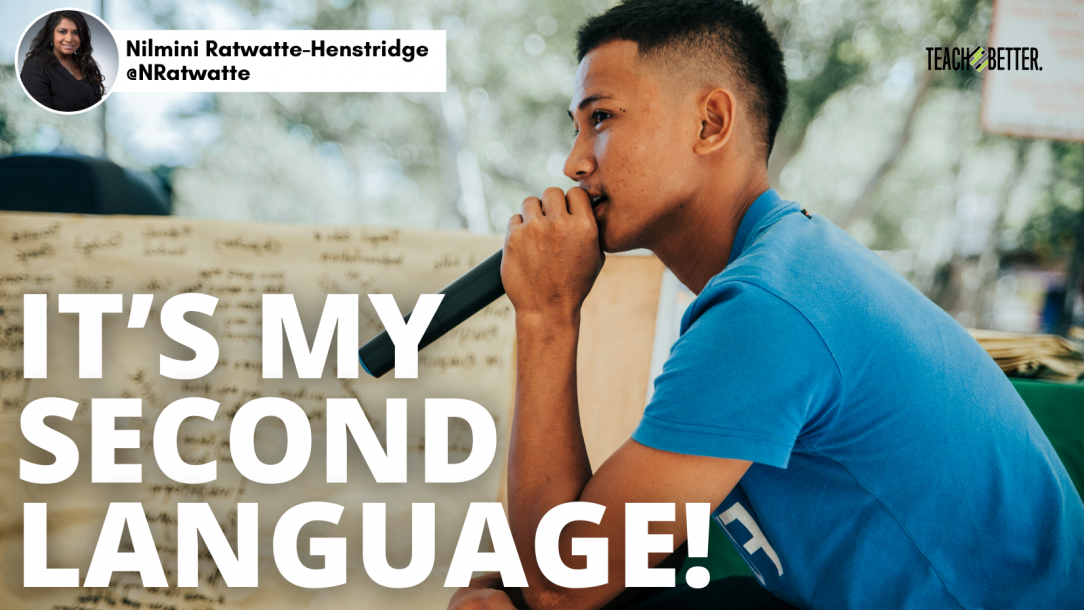TL:DR:
- We need brave spaces where we can make mistakes. It’s how students learn!
- Mastery learning provides opportunities to practice.
- We need to believe in these kids that they, too, will accomplish all of their dreams and achieve their potential.
My advice from going through the school system as an ELL (English Language Learner or Multi-Language Learner) is to always believe in yourself first.
How You Can Be Supportive as an Educator
- Be brave.
- Expect obstacles in the school system.
- Go with the people who support you!
- Give yourself time to learn and be efficient.
- Have fun! You’re going to need to practice it.
- Always set your standards high.
- Make a plan for when you need to change course and advocate for yourself.
- Let go of the people in education who say you can’t.
- Dream big dreams.
- Achieve your goals by thinking of the big picture.
True isn’t it? Language is how we communicate.
Yes, there is a story. Remember always, stories help us advocate for ourselves.
I always say be proud of your heritage, the language you speak, the customs that are passed down to you.
The school system can be difficult for a student trying their best to fit in. They are learning the language, body languages that go with the culture, and a new style of communication.
We are all teachers of multilingual learners. These are our students who need us to be there for them as they learn English in our classrooms. Click To TweetTeach explicit reading strategies. Early identification is the key to ensuring students are learning to read fluently. As a classroom teacher, every student benefits by working with ALL students in the English language (Harvard Study). We all TEACH multilingual learners!
Yes, there are those of us who have a first language and then made the time to learn English as a second language as we immigrated to a new country. The courage it takes to learn a new culture, fit in, and learn the language is something that every child should be congratulated on!
- Inclusive lesson ideas stem from awesome discussion.
- Awesome discussion teaches us about the whole child.
- Be brave and try out some of these picture books in your classroom!
Courageous Conversations: To Start Your Discussions…
Suki’s Kimono: You can have a discussion about the importance of traditional clothing that we value but we don’t wear since we want to fit into school and the courage it takes to believe in yourself.

Lights for Diwali is about a girl who wants to celebrate Diwali but there is an ice storm outdoors that day. This story shows the changes that immigrants go through as they learn how to blend into their new homeland.

Name Jar is about the importance of keeping the cultural name given to children as they attend public school systems.
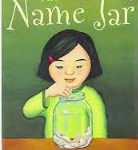
I Hate English: You can discuss the importance of feelings behind learning a second language and the emotions that come with trying to fit into a new culture and country while preserving heritage.
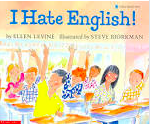
Name It: Accommodations vs. Modifications
I hope you encourage, inspire, and dedicate time to differentiate instruction to ensure your English Language Learners can achieve their potential at school.
Accommodations for students couldn’t be more essential to ensure opportunities for successful integration.
- Give extra time to complete tasks.
- Read out loud the questions so they can hear it.
- Have a dual language dictionary available to translate to first language.
- Use technology tools to assist when you’re teaching online (Twitter #MasteryChat Recap: “TECHquality for Multilingual Learners” with P. Sloan Joseph)
- Google Translate assists parents, caregivers, and students.
- Online Dictionary Access
Modifications are changing expectations to ensure the main idea is taught. They are needed for attaining the concepts.
- Highlight the important words in the question or concept that is being taught.
- Give multiple opportunities to learn, discuss, and attain the task.
- Differentiate: Make the work at the student’s language level.
- Explain what you are looking for in an answer.
- Make concise questions to evaluate content knowledge.
Students can achieve their potential.
I was that student who was a multilingual learner going through the school system. It helped me learn English as a language and meet others who were also learning English.
I do believe that all students, when given the right tools, time, and recourses, can achieve their potential. Language proficiency develops over time but underlying is the confidence that needs to come with positive reinforcement and social skills (Harvard Study).
[scroll down to keep reading]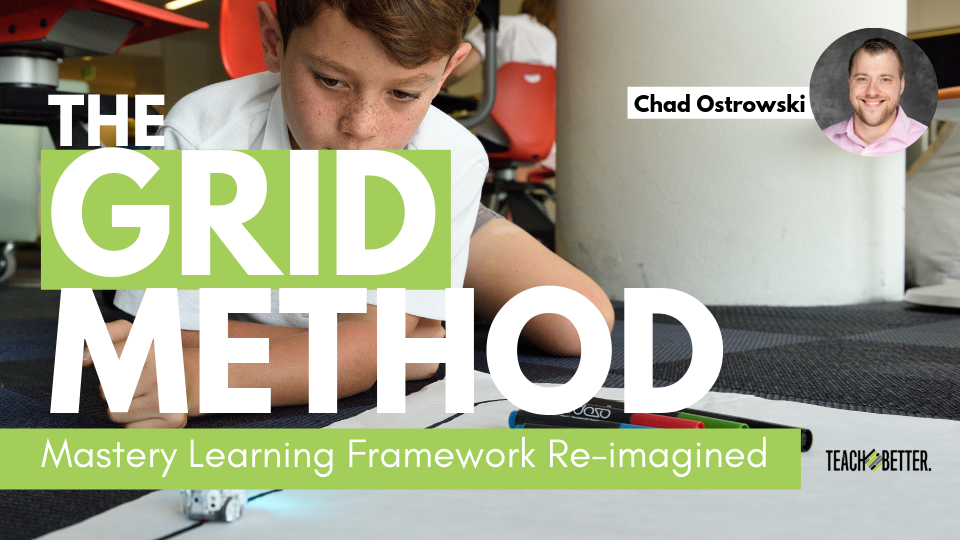
As educators in a changing education system, it is imperative to know that acquiring a second language takes time, and building the self-confidence of students and inspiring them is our responsibility.
Open doors so these students can achieve their dreams and pursue higher education in a new country as they make their way to being productive, contributing citizens in the world! Set the bar high when it comes to expectations. Don’t make the curriculum easier, rather make it specific so it works for the students who are learning to read, write, and speak in their second language.
Teachers can make a difference.
Remember the verse in the starfish story as it ends, “I made a difference to that one.” You will make a difference to many students in your career, as they become proficient English Language Learners and as they establish their knowledge on learning the language.
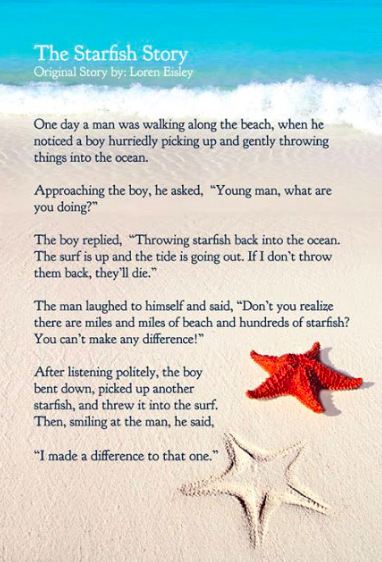
Finally, as educators, when you have the opportunity to build a connection and help English Language learners, please do so. Take away the barriers that may be present in the education system such as special education labels, streaming students out of academic courses, or grading them incorrectly without considering English Language proficiency scale according to the districts and school boards that you teach in.
We are all teachers of multilingual learners. These are our students who need us to be there for them as they learn English in our classrooms.
Yours in Education,
Nilmini
References
Starfish Poem by Lauren Eisley
https://www.gse.harvard.edu/news/03/11/proper-intervention-esl-students-not-learning-disadvantage (Harvard Graduate School)
About Nilmini Ratwatte-Henstridge
Nilmini Ratwatte-Henstridge teaches in Brampton, Ontario, Canada. She was born in Sri Lanka and immigrated to Canada with her family. As an Elementary School Teacher who is passionate about Equity, Social Justice, and Human Rights in education, she enjoys teaching the younger generation to be global-minded citizens.
Discovering the world by connecting with others is an opportunity that we have today in our society today and she loves meeting new people! She is always learning while traveling to understand the inter-connectedness of this beautiful earth we live in! Nilmini LOVES cooking great meals, watching movies, and the latest fashion trends! Family and friends are close to her heart as she looks forward to balancing social media and navigating professional learning communities in education to network globally this year!

